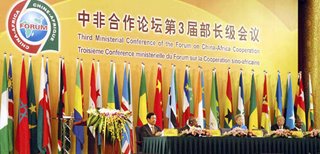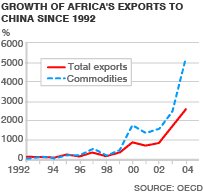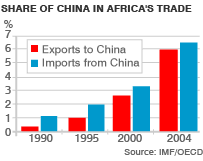 China has pledged to double its aid to Africa and provide $5bn in loans and credits over the next three years as announced in a summit attended by nearly 50 African heads of state and ministers. The 3 days summit is focusing on business with more than 2,000 deals under discussion (WOW!).
China has pledged to double its aid to Africa and provide $5bn in loans and credits over the next three years as announced in a summit attended by nearly 50 African heads of state and ministers. The 3 days summit is focusing on business with more than 2,000 deals under discussion (WOW!). 
China's drive to buy African oil and other commodities has led to a big increase in two-way trade, worth $42bn (£22bn) in 2005 with China importing 38 million tonnes of crude oil from the continent in 2005 and has made major investments in oil and gas projects in countries including Kenya, Angola and Nigeria. China needs Africa's ample/rich supplies of natural resources and raw materials to fuel its surging economy and in return, invests in African roads, railways and other infrastructure.

Often, Chinese money is funding projects that western investors had deemed too risky (source: BBC News & China Daily). When you are in Sudan, you could numerous number of people from China itself. China government-owned companies were already in Sudan since 1990s.
Five countries in the Africa continent, namely Gambia, Malawi, Burkina Faso, Swaziland and Sao Tome have formal links with Taiwan, which China regards as a breakaway renegade province rather than an independent state. China has said that the five countries are welcome to send observers to the Sino-African summit, though they remain ineligible to join in the Sino-African strategic economic partnership as long as they continue to recognise Taiwan.
Tags: China, Africa, Business, Summit, Trade


No comments:
Post a Comment